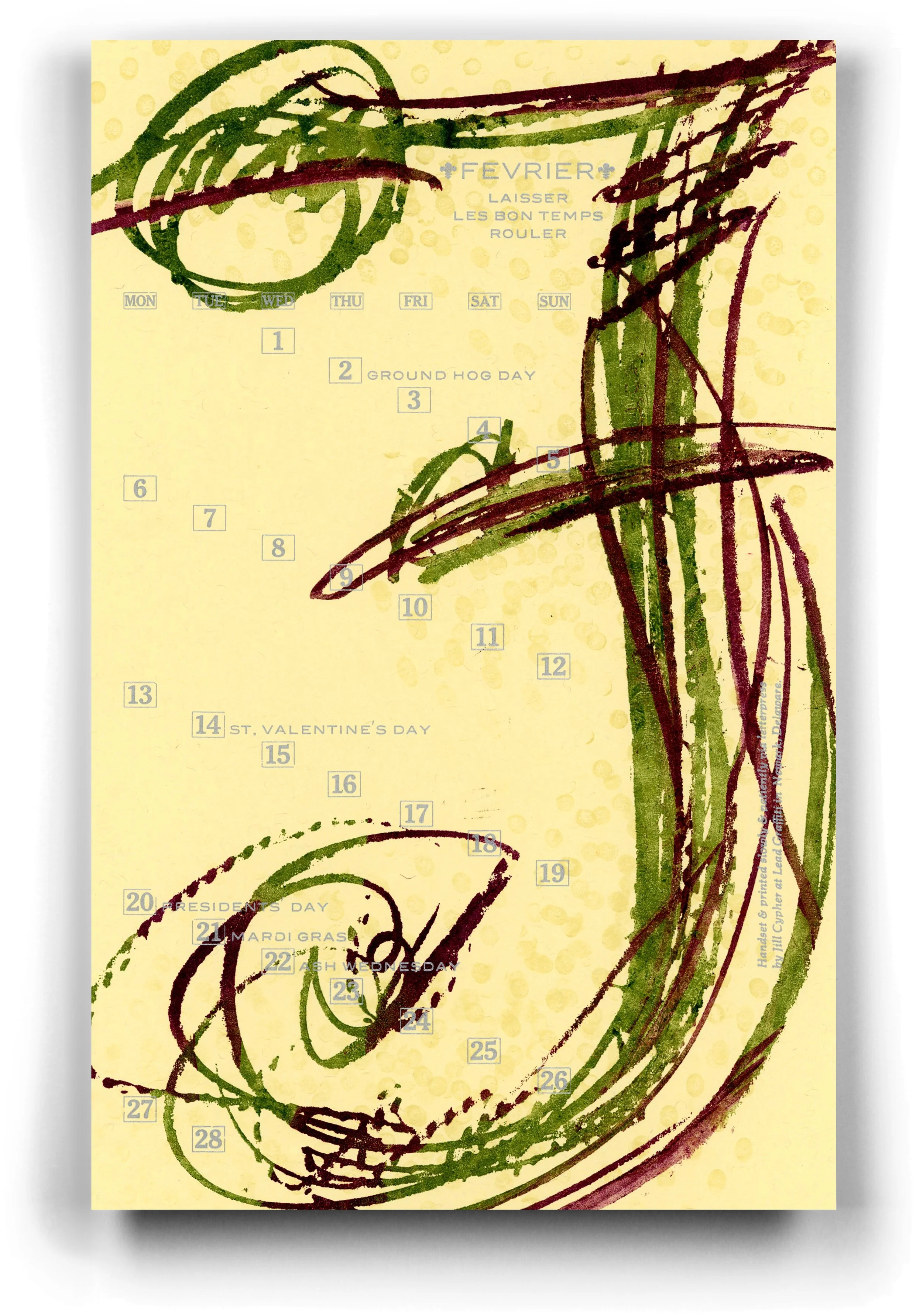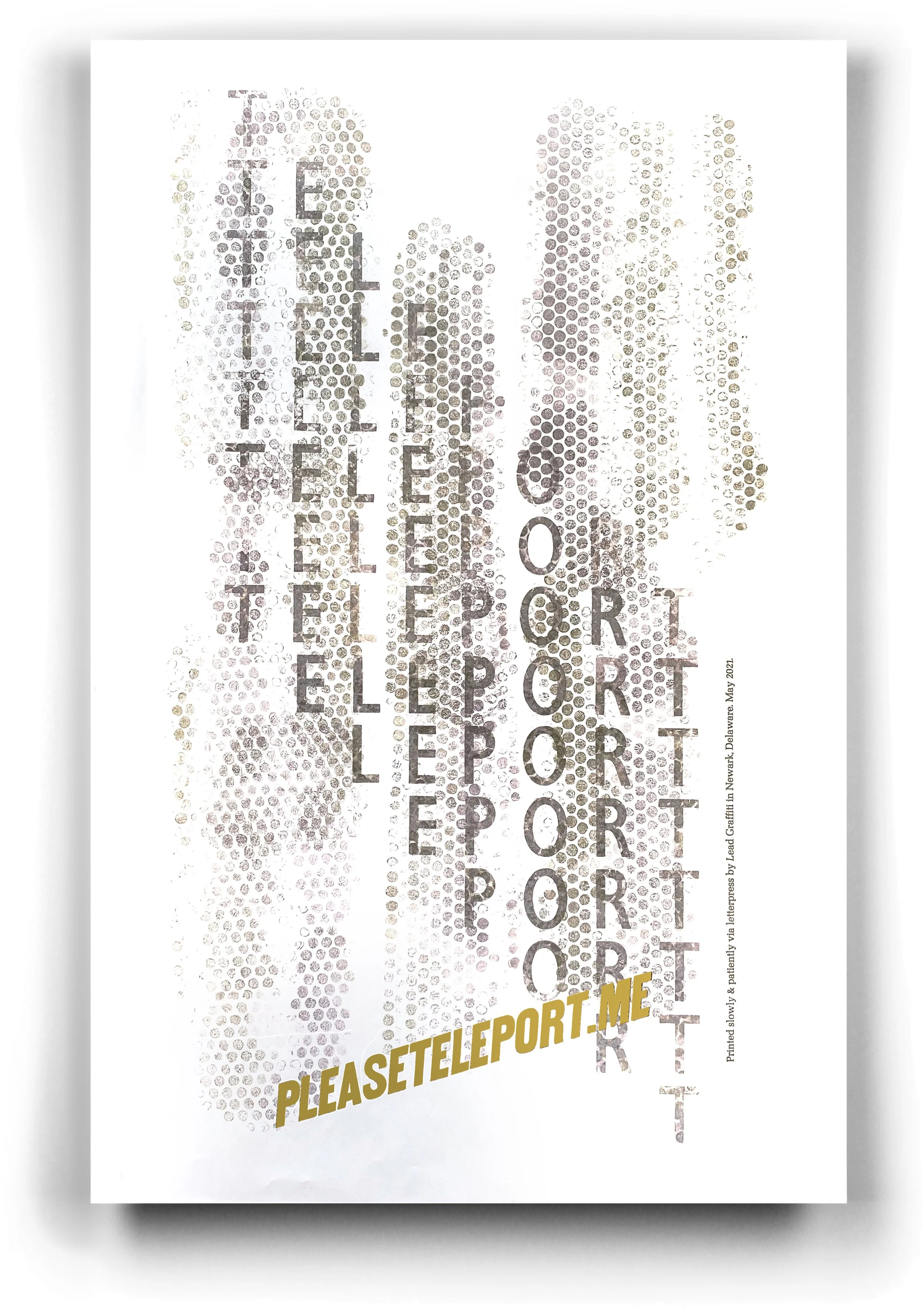TECHNICAL LETTERPRESS tours, workshops & subscriptions explained
During a technical letterpress workshop, participants learn what to look for when checking the impression depth and inking quality through an 8x loupe.
TECHNICAL LETTERPRESS WORKSHOP
A technical workshop means that we will teach you how to print with and care for our presses. Completing a technical workshop gives you the right to rent or subscribe to the use of our equipment.
Wear comfortable shoes and work clothing. Please dress for the weather: we are not air-conditioned, and in winter, much of the heat rises to the top of our 20-foot ceiling. Bring questions, your camera, and a notebook to record your process.
Anyone can propose any of Lead Graffiti’s letterpress workshops listed below. Via email, suggest up to 3 days and times (4 hours for each workshop) for any technical letterpress workshop to learn to set up, print, troubleshoot, clean, and maintain the following:
Letterpress wood & metal type composition, lock-up, and proofing.
Vandercook SP15 and Vandercook Universal III cylinder presses,
Hoe Washington #5 and Albion iron hand presses,
tabletop and floor model platen presses
Generally speaking, it doesn’t matter what days of the week or hours you choose as long as the workshop falls between 9:00 a.m. and 8:00 p.m. Also, if you have a specific interest, you can ask us to focus your workshop on a particular type of project—posters, books, wedding invitations, calendars, greeting cards, etc.
Most workshops will briefly introduce the studio layout and examples of work appropriate to the press(es) involved in the workshop to get things started. In addition to the presses, we will explain our supporting equipment, including a lead table saw, Morgana creaser, paper cutter, board shears, laser cutter, and other equipment that can provide extra value to your letterpress projects.
NOTICE: If you go for a 6-month period following a workshop without printing on a similar press, you’ll need to retake the workshop to qualify for printing privileges at Lead Graffiti. To help keep your skills up, Lead Graffiti offers free “letterpress live,” where you assist us on our printing projects. Be sure to let us help keep your letterpress experience going.
Fee for technical letterpress workshops
ONCE WE HAVE SET A TIME for your technical letterpress workshop, you must pay the base registration fee of $160 per person. When Lead Graffiti has scheduled a workshop, we will publish that time to encourage others to take it. For each additional person up to 4 who takes the same workshop, we will reduce the price for ALL attendees by $5 per hour per person.
1 person x 4 hours @ $40 per hour = $160.
2 people @ $35 per hour.
3 people @ $30 per hour.
4 people @ $25 per hour.
Encourage friends to join you in a workshop. If four people want to take the workshop together, they must pay the initial $160 apiece. We will refund any money due to each at the end of the workshop, so if four people do the workshop, we’ll refund $240 ($60 to each participant). The workshop length will be the same, no matter the number of participants.
After completing a workshop, you can rent studio space and equipment or set up a subscription to continue future personal projects. If you want to set up a letterpress shop to print wedding invites, you can do that at Lead Graffiti.
Scheduling your own time
ONCE YOU HAVE COMPLETED one or more technical workshops, you can rent time to use that press or studio space to work on your projects. You must complete the appropriate workshop for any equipment you want to use. You can pay by the hour or as an ongoing monthly subscription fee, providing you with press and studio time.
Our general rule is that we will work with you through your first three projects. After that, we expect you to be proficient enough to work independently, though we are always here for advice if necessary. Additionally, once you’ve gained proficiency, you can bring clients to Lead Graffiti and have us treat you as equals in the studio.
Press time is defined as any time your involvement with the press keeps someone else from using it. This can include setting up a project to get ready to print, stopping in the middle of your project to cut paper, mixing ink, etc. While not a hard rule generally, you should plan to use the Vandercooks in blocks of a minimum of 3 consecutive hours. If you THINK you may use the Vandercook longer than that time, you need to get it approved. Since Lead Graffiti does all of its printing on the Vandercooks, a little warning makes it easier for us to swap the required press.
TECHNICAL LETTERPRESS WORKSHOP NO. 1:
Basic type composition
PRACTICE THE BASICS of hand-setting wood and metal type before locking it in position and readying it to print on our tabletop and proofing presses.
Presses — Nolan proofing press, tabletop presses, and/or Vandercook proofing press
Potential projects —This is a great introduction to handling small projects like greeting cards, flyers, labels, business cards, etc.
It covers shop safety, traditional type composition from a California job case, printing prep, proofing, troubleshooting, clean-up, and resources.
⬆ The image above shows a lock-up using hand-set metal type, printer’s ornaments, spacing, and leading assembled to print a two-color holiday card.
TECHNICAL LETTERPRESS WORKSHOP NO. 2:
Vandercook cylinder presses
You must register for the whole, single-person fee of $160. For each additional person up to 4 who takes the same workshop, we will reduce the price for ALL attendees by $5 per hour per person.
Presses — Vandercook SP15, 14 x 18, hand-cranked, and our Vandercook Universal III, 18 x 24, power. Both presses are included in the workshop.
Potential projects — 2-color broadside, calendars, fine press books, wedding invitations and more.
While paper for both presses is hand-fed, the SP15 is hand-cranked, and the Universal III is a push-button automatic with 3 modes. These presses have lots of muscle, are relatively easy to use and quite versatile in the projects that they can print. In this workshop, you'll work with both as you learn shop safety, printing tips, press adjustments, plate options, soft vs. hard packing for the right impression, maintenance, troubleshooting, and resources.
⬆ The calendar page shown here was printed in 3 colors using 1 photopolymer plate and hand-set type for the numbers. The plate was hand-rolled in 2 colors to accentuate the hand-drawn effect of the calligraphic letter F.
TECHNICAL LETTERPRESS WORKSHOP NO. 3:
Iron hand presses
You must register for the whole, single-person fee of $160. For each additional person up to 4 who takes the same workshop, we will reduce the price for ALL attendees by $5 per hour per person.
Presses — R. Hoe Washington #5, 25 x 38, and a Harrild & Sons Albion Super Royal, 21 x 29. We’ll probably work on one or the other during the workshop (the person initiating the workshop can choose which press).
Potential projects—As our biggest presses, they are great for printing with very large wood type, so think posters and experimental hand-rolled art prints.
Made of cast iron instead of wood like Ben Franklin's "common press", these hand-pulled presses are relatively simple to operate for straightforward jobs printed on dampened papers. Get your hands on both Lead Graffiti presses as you cover shop safety, press adjustments, paper handling, inking, resources, and more. This is truly old school. It is surprising how many kids love printing on these during our H.N. Werkman workshop.
⬆ This 25” x 38” broadside utilized the press size on our larger iron hand press to create a much larger piece than we can print on our Vandercooks. Printing the word “TELEPORT” took six runs as the wood type we used only had four capital Ts. “PLEASETELEPORT.ME” was the seventh run. Bubblewrap around a block of corrugated cardboard was inked with a hand brayer and overprinted about fifteen times to create the snakeskin texture.
TECHNICAL LETTERPRESS WORKSHOP NO. 4:
Floor model platens
You must register for the whole, single-person fee of $160. For each additional person up to 4 who takes the same workshop, we will reduce the price for ALL attendees by $5 per hour per person.
Press — Chandler & Price 10 x 15.
Potential projects—Flyers, coasters, postcards, greeting cards, wedding ensembles, and any high- volume project where speed or special finishing operations are required.
NOT FOR THE FAINT OF HEART, this press is easily the most dangerous and requires total concentration from you during use. Your hands-on experience covers shop safety, printing tips, troubleshooting, maintenance, and resources.
THIS POPULAR FLOOR-MODEL PLATEN PRESS is the go-to workhorse for large and small letterpress shops. You'll appreciate that you can quickly print, score, die cut, and perforate, all in the space of 20 square feet.
⬆ Coasters are a fun item, and the thickness of the paper requires that they be printed on a platen press. To start the project, we cut the circles out of square coasters on this same press. Then we utilized the registration of multiple printings of each color to rotate the coasters randomly to make each one unique.
A COUPLE OF NOTES : 1) We believe we can do 2 workshops on the same day as long as there is an hour between them. 2) We both have all 4 COVID vaccinations but may tend to wear masks if we can’t stay reasonably well separated. Wear comfortable shoes and work clothes. We have aprons available as well. The studio doesn’t have air-conditioning.
LETTERPRESS LIVE
In addition to the above workshops, we are initiating “LETTERPRESS LIVE” for people interested in letterpress. This allows up to 2 people (no experience needed) to come to the Lead Graffiti studio to observe and possibly assist while we print various projects. We will try to schedule these with at least a couple of days’ notice as they arise and post to our calendar.







